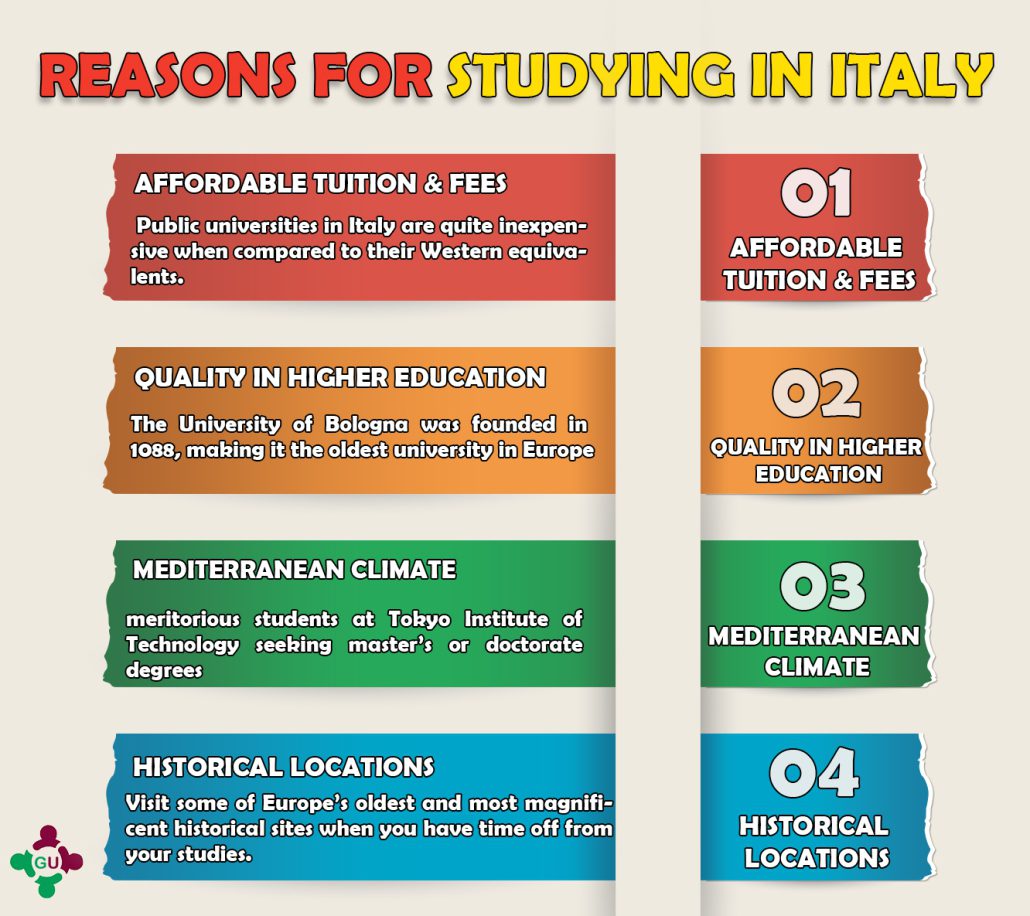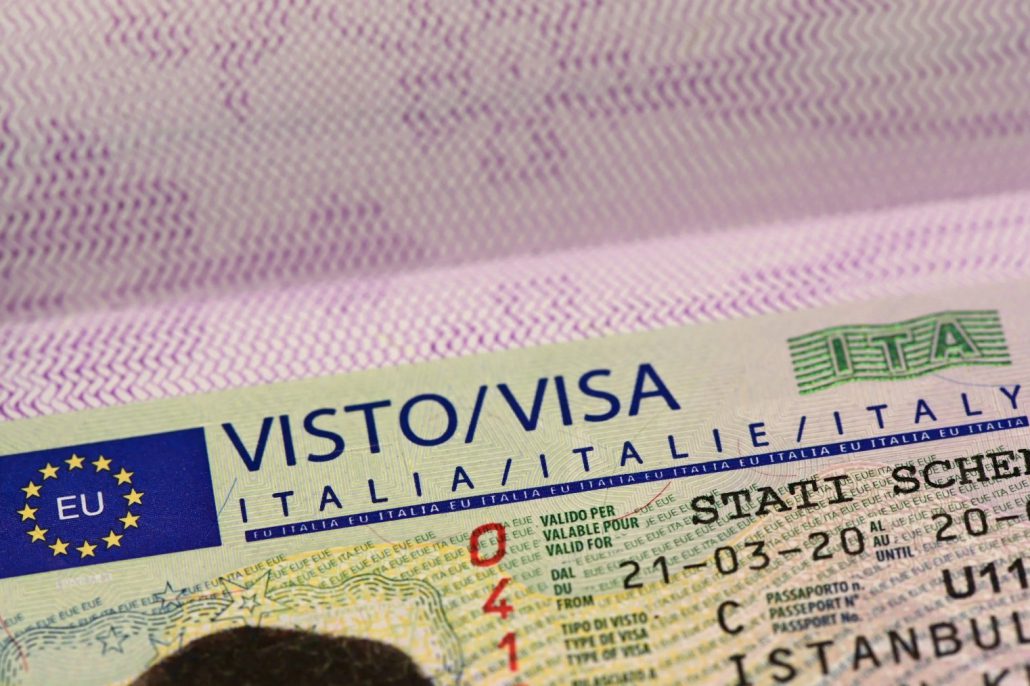Study in Italy for international students free 2024 + Scholarships
Estimated reading time: 16 minutes
Italy is a nation in southern Europe that is the fifth most populous country in Europe and one of the continent’s primary economies. The country has a wealth of natural beauty, with stunning landscapes and ancient cities that have kept up with modern times. Additionally, Italy is home to warm, enthusiastic people, a rich culture and history, and esteemed universities with diverse fields of study. All of these factors have combined to make Italy a popular destination for students from around the world seeking to pursue higher education.
Italy is home to almost 100 universities, as well as numerous scientific and research centers. These institutions have made significant progress in recent years and are constantly moving forward. Despite their high standards, Italy is considered one of the easiest countries for international students to gain admission, offering easier conditions for entry than many countries in Europe, North America, and East Asia.
5 Reasons for studying in Italy
1-Affordable tuition & fees: Public universities in Italy are relatively inexpensive compared to Western universities. If you’re from an EU/EEA nation, your tuition won’t exceed 4,000 EUR annually. Furthermore, it is easy to find study programs that cost significantly less.
2-Exceptional quality in higher education: The University of Bologna, founded in 1088, holds the distinction of being the oldest university in Europe still in operation. With a history spanning almost a millennium, it has established itself as an institution of great significance in the academic world. The Bologna process, adopted by the European Higher Education Area (EHEA), aims to create a more cohesive, standardized, and attractive educational framework. This means that your degree will be recognized and accepted in all European countries that participate in the program.
3-Being the forefront of architecture and fashion:
Italy is renowned for its excellence in fashion, arts, and architecture, and a single visit can make it evident why. Among the world’s four fashion capitals, Milan stands out. If you tour the charming Italian cities, you will witness exceptional buildings and unique architectural styles that seem to have been ignored in the development of modern architecture.

4. Impressive Mediterranean climate
The Mediterranean lifestyle has long been known for its health and wellness benefits, thanks to the warm sun, sea breeze, and abundance of delicious fruits and vegetables. Sardinia, for example, is one of the few “Blue Zones” in the world where people commonly live to be over 90 years old.
5. Incredible, time-defying historical locations
If you get some time off from your studies, you can visit some of Europe’s oldest and most magnificent historical sites. These locations include the Colosseum, the Pantheon, the Valley of the Temples, and Ostia Antica. Even today, these places still retain their former glories and can be explored to get a feel of their rich history.

Top Universities in Italy
Italy offers a diverse range of higher education institutions where you can pursue a full-time degree. It’s also worth noting that postgraduate studies are available in Italy through non-university institutes. Here are some of the types of educational institutions you can find in Italy.
State University: In Italy, most of the universities are public research institutions. There are a total of 67 universities, varying from extremely large institutions that can accommodate around 100,000 students to small and specialized colleges with only a few thousand students. Each public university operates independently and has its own set of priorities and administrative procedures.
Private universities: There are 29 private universities in Italy. If you are an international student, it is important to make sure that the Italian Ministry of Education recognizes the private university you choose. The educational quality and standing of graduates from state-recognized private colleges are equivalent to that of graduates from public universities. The primary difference is in the way these universities are funded, which leads to higher tuition fees for the private ones.
Universities for foreigners (Università per Stranieri): Two universities specialize in teaching Italian language and culture to international students. The oldest one was founded in Perugia in 1921, and the other is located in Siena. In addition to their regular academic duties, these universities are responsible for administering two Italian language tests: CILT and CELI.
Higher schools (Scuole Superiori): These schools can only focus on postgraduate university programs due to their specific legal position.
Technical universities (Politecnico): State universities and technical institutions are similar, but they solely focus on engineering and architecture.
Online/distance universities: These colleges use online learning to deliver state-approved courses.
Italy’s success in the three major ranking systems, with a number of institutions among the top 300 in the world, reflects its status as a significant center for higher education in Europe.
| Institution | QS Ranking | THE Ranking | ARWU |
| University of Bologna | 166 | 172 | 201-300 |
| Sapienza University of Rome | 171 | 197 | 151-200 |
| Scuola Normale Superiore di Pisa | – | 197 | 401-500 |
| University of Padua | – | 201-250 | 151-200 |
| Sant’Anna School of Advanced Studies – Pisa | – | 201-250 | – |
Program types in Italy
Italian universities have numerous exchange and double degree agreements with other universities in Europe due to the strong higher education system in Italy and active involvement with European institutions and partners. Italian Master’s degrees can provide access to other top-tier European universities.
Italian Master’s degrees are earned after two years and 120 ECTS, which are divided between core courses, electives, seminars, and the dissertation (which represents 30 ECTS by itself). The first and second years of a master’s degree are separated by a summer break and are divided into four semesters.
Your Master’s degree will mostly be comprised of lectures, tutorials, group projects, and coursework (if you are in the sciences or engineering, then you will likely have practical sessions too). The goal is to impart greater technical, interpersonal, and research skills as well as improved subject knowledge.
Bachelor’s study
In Italy, it generally takes three to four years to obtain a bachelor’s degree; however, this period might considerably increase in certain disciplines. For example, students who intend to study fields such as law must study for five years at the Bachelor’s level, and after that, they will be eligible to enter the job market in this field. Also, students in fields such as medicine and dentistry must study for approximately six years in order to receive a work permit.
It should be noted that the majority of fields are currently taught in Italian, with the exception of a few specialized ones like medicine and pharmacy, which are taught in English. This is important to note because language is often cited as one of the biggest obstacles faced by international students.
Furthermore, Italian universities do not require applicants in Bachelor’s degree programs to hold a certificate in the Italian language. However, an Italian language certificate is required in order to apply for a study visa from this country through its embassies! If you want to begin your studies in Italy with a bachelor’s degree, you should definitely go through an Italian language test.
Master’s study in Italy
In general, the duration of obtaining a master’s degree in most Italian universities is two years. The academic requirements at this stage are in Italian or English, and the applicant must obtain a valid certificate in Italian or IELTS (or TOEFL), depending on the field he chooses.
Ph.D. study in Italy
The doctoral course is considered one of the most demanded courses in Italy, and many international students from all over the world want to complete this course in Italy. The duration of a doctorate is approximately 4 years, and fortunately, most majors in most universities in this country introduce English as the official language of teaching at this stage. This is why it is necessary to present a valid certificate in English to get admission to this course and to receive a study visa.
Admission Requirements to Study in Italy
If you’re interested in studying in Italy, it’s important to understand the application process. While it can be challenging, this guide will help you navigate the main steps. First, you should confirm whether the university you’re interested in accepts your qualifications. This is known as a prior evaluation. Once you’ve completed this step, the institution will provide feedback and let you know if you meet all the requirements. Next, you’ll need to send a pre-application request to your Italian embassy or consulate. They will handle the rest of your application process. Accepted applicants will be listed on the embassy or consulate’s website before the end of August, so be sure to check there.
You will need to submit the following documents with your application:
1-Valid ID
2-Passport-sized photo
3-University transcripts
4-Filled application for the university
5-CV, SOP, Recommendation letter
6-English or Italian language proficiency test
7-If you’re submitting an application to a program in architecture, urban planning, or design, your portfolio is required.

Tuition & fees to Study in Italy
Italian universities are known for providing high-quality education at comparatively lower tuition costs than the rest of Western Europe or North America. This is mainly due to the public funding that these institutions receive. There are several factors that can affect the cost of tuition. Public universities generally charge significantly less than private institutions, however, the quality of education is similar across all types of higher education institutions.
The tuition fees for students, both EU and non-EU, may vary depending on the program they choose and their family income. Public universities charge a minimum of €900 and a maximum of €4,000 per year. On the other hand, private universities charge between €6,000 and €20,000 annually.
The universities in Italy offer merit-based scholarships to talented international students that may cover the cost of tuition.
The table below shows the tuition and fees of the most popular universities in Italy:
| Institution | Tuition & fees/year |
| Ca’ Foscari University of Venice | €800- €2,400 |
| Politecnico di Milano | Maximum of €4,000 |
| IULM Milan | €3,200 to €10,000 |
| Sapienza University of Rome | €600 to €1,200 |
| Università Cattolica del Sacro Cuore | Depending on income, EU students pay between €7,000 and €16,000; non-EU students pay €15,800. |
| University of Genova | Maximum of €3,500 |
| University of Milan | €3,500 |
| University of Padua | €2,800 |
| University of Pavia | €3,000 |
Can I study in Italy for free?
Numerous international students may be curious about whether it is possible to pursue studies in Italy for free. Fortunately, Italy does offer some opportunities for free or extremely affordable education. The tuition fees for public universities may vary based on your household’s income. Depending on your individual circumstances, you may be able to attend a course for free or at a significantly reduced cost.
The amount of income below which there are no tuition fees is determined by each university on an individual basis. To be considered for the “ISEE“ assessment, which determines your household income, you must submit a number of supporting documents. Unfortunately, non-EU students cannot use this option at some universities.
Don’t give up if you can’t find a way to study for free. Even the most expensive program fees are more reasonable than in other well-known European locations. And when you consider the wonderful time you’ll have studying in Italy, it will definitely be worth it! Additionally, there are scholarships available for students from abroad. For example, DSU SCHOLARSHIP.

Cost of living in Italy
The cost of living in Italy for an international student varies depending on different factors, such as the city, your lifestyle preferences, and how often you plan to dine out. Generally, you will need to budget between €900 and €1,300 per month to cover expenses like rent, food, transportation, and entertainment.In some cities, rents are significantly higher than in others. Accommodations are less expensive in cities like Naples, Pisa, or Genoa than in well-known pricey cities like Rome, Milan, and Venice. Here are some examples:
1-You can rent a room in Rome Romacapital’s city for between €350 and €500 per month, including utilities.
2-A room in Bologna might cost you between €350 and €500 a month in rent in addition to utility costs.
3-The starting price of a room in Venice (Venezia) will be comparable to those in Rome and Bologna, and occasionally shared rooms in Mestre, the city’s onshore area, can be found for €200 to €250. To actually get to campus, if you live there, you’ll need to put some of your savings toward a travel card. (But keep in mind that gondolas are not included.)
4-The average cost of a chic Milan (Milano) room is between €400 and €500 per month, plus bills.
5-Most rooms in Pisa cost between €200 and €400.
The cost of your groceries is heavily influenced by your shopping habits and personal preferences. If you are in a residential area, discount supermarkets are likely to be less expensive than small convenience stores located in the city center. Leading a comfortable student life can cost you between €200 and €300 per month.
Here is the average cost of living in Italy
| Accommodation | Living month/month |
| Single person | €350-€450 |
| Student accommodation | €200-€400 |
| Students (Shared) | €250-€400 |
Food cost
When budgeting for groceries in Italy, it’s advisable to plan for €200 per month. You can find reasonably priced groceries in neighborhood markets. The average cost of pasta dishes in restaurants ranges from €6 to €12, while the main course costs between €8 and €16. If you’re looking to save some money, opt for takeout whenever possible.
Useful Hint: Street vendors and cafeterias offer affordable food options. Additionally, some bars and restaurants may charge extra fees for takeout orders. Therefore, it is advisable to choose takeout whenever possible.
Transportation costs
Depending on the city in which you are moving, the cost of transportation will vary. The most practical and simple method of transportation in Italy is public transportation. The cost of transportation in Italy varies depending on where you live and ranges from €25-€35 per month. In cities, renting a bike is an additional option.
Train tickets cost €20 to travel to other Italian cities, but there are significant discounts available for booking in advance.
Other Costs of Living in Italy
In Italy, your monthly phone/mobile bill could be up to 140 euros. You’ll spend about 30–40 euros on entertainment and other social activities. To study in Italy, there are numerous grants and scholarships available. Look them up and find out if you qualify for any of them.

Visa in Italy
If you’re planning to study in Italy and you’re not from the EU or EEA, you’ll need a long-term D visa. This visa costs around €60 and is necessary for anyone planning to stay in Italy for more than three months. To ensure you have your visa on time, it’s recommended to apply for it three months before your expected arrival in Italy. For students from the EU and other countries who plan to stay longer than 90 days, a residence permit is required. If you fall under this category, you must apply for a residence permit in Italy.
Step-to-step instruction for student visa in Italy
1-Get the university’s acceptance letter: To reserve your spot at the Italian university of your choice, pay any fees that are required.
2-Visit or call the embassy or consulate that is closest to you: Schedule a visa interview and learn the specifics of the visa procedure for your home country, including the documents you must submit.
3-Show up for a visa interview: Send the required documentation along with the application fee.
4-Await the final result: You will receive a visa outcome in writing.
5-Apply for a residence permit: You must apply for your residence permit at the closest Questura, a type of police station, within eight days of your arrival in Italy. Additionally, this step needs to be finished within 20 days of arrival for EU students.
6-Obtain a permit: You might be given a temporary document while waiting for your permit, which could take a few months.
Italy’s requirements for student visas
1-Passport-sized color
2-Valid passport
3-Admission letter for an Italian university
4-Financial capability proof
5-Health insurance
Processing time for student visa in Italy
Generally, it takes around one to three weeks to process a visa application. However, it is recommended that you schedule your visa interview at least six weeks in advance. Therefore, it is advised to begin the visa application process two to three months prior to your departure date. Any delays in the procedure may result in not receiving the visa on time if you wait until the last minute.
Frequently Asked Questions: Studying in Italy
Italy is home to several prestigious universities. Some popular ones for international students include the University of Bologna, Politecnico di Milano, Sapienza University of Rome, and the University of Milan.
While many courses are offered in Italian, there is an increasing number of programs taught in English, especially at the postgraduate level. It’s advisable to check the language requirements for the specific course you are interested in.
To apply for a student visa in Italy, you generally need an acceptance letter from an Italian university, proof of financial means, and health insurance. The specific requirements may vary, so it’s recommended to check with the Italian consulate or embassy in your country.
Yes, there are various scholarships offered by the Italian government, universities, and other organizations. The eligibility criteria and application procedures vary, so it’s advisable to explore scholarship opportunities well in advance.
The cost of living in Italy varies depending on the city and lifestyle. On average, students can expect to spend around 800 to 1,200 euros per month, including accommodation, food, transportation, and other expenses.
Yes, international students are allowed to work part-time during their studies in Italy. However, there are restrictions on the number of hours you can work, and it’s important to comply with Italian labor laws.
Bachelor’s programs usually last three years, while master’s programs typically last one to two years. Doctoral programs vary in duration but are generally around three to four years.
While many universities offer courses in English, knowing Italian can enhance your overall experience and make daily life more comfortable, especially if you plan to interact with locals and explore beyond the academic environment.
Rome, Milan, Florence, Bologna, and Turin are among the popular cities for international students. Each city offers a unique cultural experience and a range of academic opportunities.
International students in Italy are usually required to have health insurance. The country has a well-developed healthcare system, and students can access medical services through the National Health Service (SSN) once they have the appropriate insurance coverage.
It’s important to note that information may change, and it’s always advisable to check with official sources or the respective institutions for the most up-to-date and accurate details.



Dear sirs:
Hi I am fatemeh from Iran. I am going to study in Italy.
Hi Fatemeh, there are several scholarship opportunities available to you. Here are a few to consider:
Erasmus+ Program
Italian Government Scholarships
University of Bologna Scholarships
other Italian universities scholarships
I recommend visiting the websites of these organizations and checking with the Italian embassy in Iran for more information on scholarship opportunities for Iranian students in Italy.
I am Azizullah Naibi from Afghanistan, I am interested in studying in Italy and I want to benefit from free scholarships, can you help me